Two years after sustaining a spinal cord impairment, Andrew Leslie has completed a 5km run.
When the tetraplegic stumbled to the finish line in an ungainly fashion to a warm round of applause on March 18, he had nothing left.
'I'm [was] exhausted to be honest,” he says.
'I completely emptied the tank. It wasn't pretty at times, but what a sense of accomplishment.”
Two years ago, the 49-year-old broke his neck in Wellington's Mākara Peak Mountain Bike Park.
He damaged his spinal cord and became a tetraplegic.
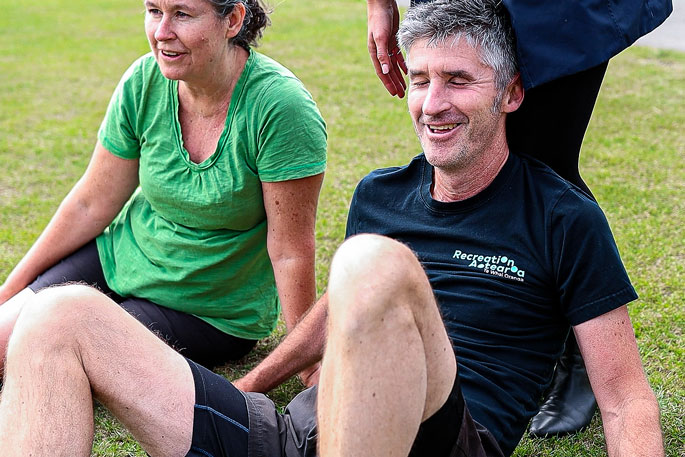 Andrew Leslie and Helen Leslie at finish line.
Andrew Leslie and Helen Leslie at finish line.
As of December last year, there were 2282 active claims for serious spinal cord injuries across New Zealand, with 152 of these in the Bay of Plenty region – the fourth highest in the country behind Auckland, Waikato, and Canterbury.
The nationwide cost of supporting people with these injuries was more than $338 million in 2021, and more than $24m in Bay of Plenty.
Eight people sustained a serious spinal cord injury in Bay of Plenty in 2021, again the fourth-highest in New Zealand.
When he was in an induced coma in an intensive care unit, Andrews's family were told to be prepared for him being in a wheelchair for the rest of his life.
It was a reality he never accepted.
One year on, he has achieved the unthinkable.
It has been a challenging and rewarding journey.
'When I go back two years from now to where I was lying in the Burwood Spinal Unit to where I am now, I can't believe it. I feel extremely lucky that I have had this sort of recovery. I know it doesn't happen for everyone. Every spinal cord injury is different.”
ACC played a role in Andrew's rehabilitation.
'The ongoing support from ACC has been a real plank in my recovery,” he says.
'I love everything about running, I love how it feels. I love being in those environments. I love the fitness I get from it… to get that ability back has been an emotional experience.”
Learning to run again
Andrew had a seed of hope after coming out of hospital.
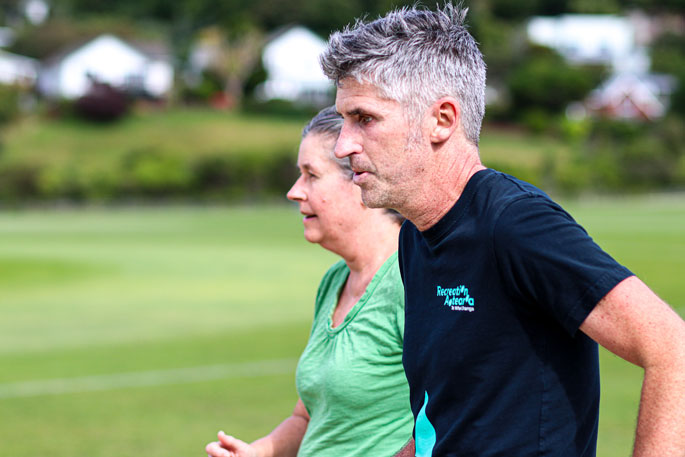 Andrew completing the 5klm run at Karori Park in Wellington March 18. Photos: Ezra McDonald/ACC.
Andrew completing the 5klm run at Karori Park in Wellington March 18. Photos: Ezra McDonald/ACC.
'I had a remarkable recovery within hospital. I was able to get from my wheelchair to walking and that gave me a lot of confidence. That I could continue to improve and recover.”
About a year and a half ago he floated the idea to his physio at the time. It was a well-planned and deliberate process.
Andrew started in a highly supportive environment.
He began in a hydrotherapy pool. He progressed into a rehabilitation gym at Keneperu Hospital and then onto a treadmill where he was supported by a harness.
Almost a year ago he took his preparation out on the park. It was a big milestone.
'It was about having enough confidence so I could push it a bit further in an unsupported environment,” he says.
Over the past few months, Andrew has gone from a restricted movement to the running motion he can complete now.
'In the early days I was trying really hard to run. I would go from walking to tell myself ‘try to run'. Looking back on some videos on it, it wasn't a run. [laughs]. It was kind of like I was marching. My knees were a bit higher than my walking gait. It wasn't happening. Which is a similar place to where I was before I started to walk.
'The question kept popping into my head so how do I run? My body wouldn't flick into running. I would try to make it run. It just wasn't happening.”
'A watershed moment”
Andrew was getting increasingly frustrated. Around the same time, he was having recurring dreams about running.
'I could feel what it felt like to run. My brain was trying to work it all out. I just needed to find the right focus and approach to let it all happen.”
Leslie described it as a 'watershed moment”. He said to himself ‘maybe you are overthinking this'.
'I felt like I just needed to let go. I had to let my body run. I knew it was in there somewhere I just had to find the mental cue to unlock it.
Andrew has been searching out other methods to progress his rehabilitation. He has invested in neurophysics, yoga therapy to go with his ACC funded physiotherapy.
It was a game changer.
'The theory is that your body knows what to do, you have just got to have confidence in it for that to happen. Your brain can find a way to sending the messages where it needs to. You have got to move aside and let it happen.”
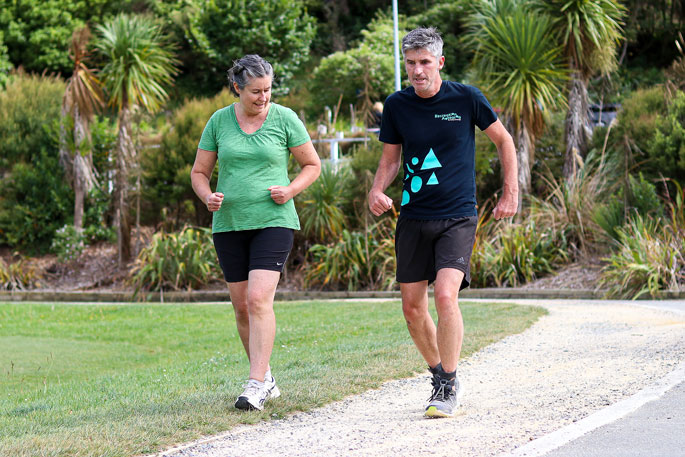 Andrew Leslie and Helen Leslie.
Andrew Leslie and Helen Leslie.
There was a moment at Karori Park, Wellington, – using all of those strategies he had learned - where it all clicked.
'It was a really emotional moment because I knew I had done it, I had unlocked it. All of sudden it felt like running.”
From there Leslie built up to running 100m, 1km and in the build up to the run on Friday he completed 4km.
He says being able to run again has helped his self-esteem.
'To know that I can challenge myself and meet those challenges. That is huge for my confidence.”
Hans Wouters is the CEO of the New Zealand Spinal Trust. He describes Andrew's feats as 'remarkable”.
'From being told he might never walk again to running 5km in only two years is an amazing achievement,” says Hans.
'This is testament to Andrew's remarkable grit and determination.
'The New Zealand Spinal Trust is proud to have played a role in Andrew's rehabilitation during this time. Each of the 220 spinal cord impairments sustained by New Zealanders each year are different, and everyone is on their own unique journey to improve their overall health.
'Andrew's achievements in such a short space of time are quite remarkable.”
Andrew is sharing his story to help others. He wants to show people what is possible.
'Maybe there is something in my story for others. I'm not suggesting that everyone with a spinal cord injury can run. Everyone is on their own unique pathway. The message I want to convey is don't stop trying. Believe that you can improve your position.”
Making a difference for others
Andrew is the CEO of Recreation Aotearoa.
They are focused on making a difference to New Zealanders living with a disability.
He is recruiting a new staff member who will focus on improving the accessibility of active recreation. This will be primarily outdoor recreation and also focus on facilities and play spaces.
'Because of the work I do I am fully aware that I can be influential in changing the system to help improve access to people with a disability into recreation.”
Leslie says being in the outdoors can be a hugely important part of a person's rehabilitation.
'It fuels the mind, body and soul,” he says.
'There is a strong desire to make a difference in that area around Aotearoa. My role is a connector and a facilitator there.
'It has been huge for me. I want others who are living with a disability to have that experience.”
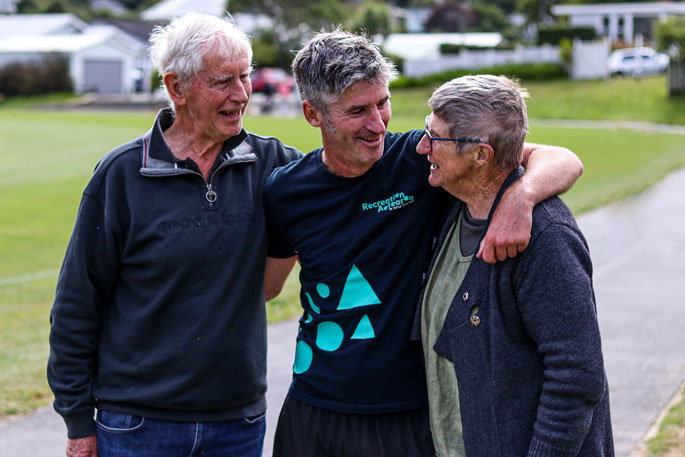 Andrew Leslie with Arnold and Marie Leslie.
Andrew Leslie with Arnold and Marie Leslie.

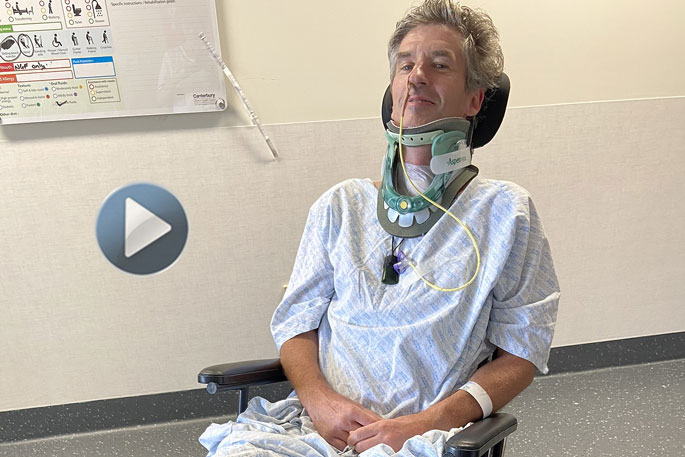

0 comments
Leave a Comment
You must be logged in to make a comment.